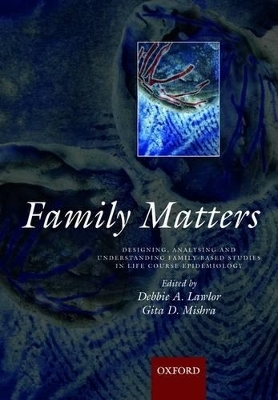
Family matters
Oxford University Press (Verlag)
978-0-19-923103-4 (ISBN)
Family-based studies, including intergenerational, sibling, and twin studies, are increasingly being used to explore life course epidemiology. However, there are issues relating to study design and the statistical analysis of family-based studies that are still not well understood, and comprehending the underlying assumptions of these studies and drawing the inferences from them can be complex.
This book provides the knowledge and skills required to design, analyse, and correctly interpret family-based studies. It explains what these studies can tell us about life course epidemiology; provides practical guidance on how to set-up and maintain birth cohorts for completing family-based studies in life course epidemiology; describes how to undertake appropriate statistical analyses of family-based studies and correctly interpret results from these analyses; and provides examples that illustrate the ways in which family-based studies can enhance our understanding of life course epidemiology. In addition, there is discussion of difficulties specific to setting up such studies in low- and middle-income countries, and issues relating to proxy informants, where parents provide information on children and vice versa, or siblings provide information about each other. Examples of how family-based studies have been used in understanding the life course epidemiology of cardiovascular disease, mental health, and reproductive health illustrate the applicability of the research to these areas, but also more generally to the wider field of life course epidemiology.
Professor Deborah A. Lawlor completed medical training (University of Bristol) in 1986. She has an MPH (with distinction) from the University of Leeds, an MSc in Medical Statistics from the London School of Hygiene and Tropical Medicine and a PhD (MRC Training Fellowship, University of Bristol) in Epidemiology. She is the scientific director of the Avon Longitudinal Study of Parents and Children mother's study and a co-director of the British Women's Heart and Health Study. She has contributed to understanding the life course and genetic epidemiology of insulin resistance, diabetes, cardiovascular disease and women's reproductive health, and has developed methods for improving causal inference in observational epidemiology by using family-based studies and genetic variants as instrumental variables for making causal inferences about modifiable non-genetic risk factors. She is the Deputy Director of the MRC Centre for Causal Analyses in Translational Epidemiology. Dr Gita D. Mishra has an MSc and a PhD in Statistics from the University of Auckland, New Zealand and was awarded Chartered Statistician status by the Royal Statistical Society in 2004. She is a senior research scientist at MRC Unit for Lifelong Health and Ageing, University College London and an adjunct Associate Professor at the School of Population Health, University of Queensland, Australia. She has extensive research experience in the fields of statistical methodology for longitudinal studies, life course epidemiology, and women's health. Her work on intergenerational mobility has revealed some of the links between the timing of changes in social class and their effects on later dietary patterns and the way that such influences differ for men and women. Her research on missing data techniques has led to the development of a practical methodology for the selection of variables to be included in a multiple imputation model both in the context of cross-sectional and life course data.
1. Why family matters - an introduction ; SECTION 1: WHAT CAN FAMILY-BASED STUDIES TELL US ABOUT LIFE COURSE EPIDEMIOLOGY? ; 2. Theoretical underpinning for the use of intergenerational studies in life course epidemiology ; 3. Theoretical underpinning for the use of sibling studies in life course epidemiology ; 4. Theoretical underpinning for the use of twin studies in life course epidemiology ; 5. Discussant chapter: summary of the theoretical approaches to family-based studies in life course epidemiology ; SECTION 2: THE PRACTICALITIES OF UNDERTAKING FAMILY-BASED STUDIES ; 6. Theoretical underpinning for the use of intergenerational studies in life birth cohorts: a resource for life course studies ; 7. Family-based life course studies in low- and middle-income countries ; 8. Using available family members as proxies to provide information on other family members who are difficult to reach ; 9. Discussant chapter: the practicalities of undertaking family-based studies ; SECTION 3: HOW TO UNDERTAKE STATISTICAL ANALYSES OF FAMILY-BASED STUDIES ; 10. Statistical considerations in intergenerational studies ; 11. Random effects models for sibling and twin-based studies in life course epidemiology ; 12. Discussant chapter: statistical considerations in family-based life course studies ; SECTION 4: USE OF FAMILY-BASED STUDIES IN LIFE COURSE EPIDEMIOLOGY ; 13. Family-based studies applied to the influence of early life factors on cardiovascular disease ; 14. How family-based studies have added to the understanding of life course epidemiology of mental health ; 15. How family-based studies have added to understanding the life course epidemiology of reproductive health ; 16. Discussant chapter: using family-based designs in life course epidemiology ; 17. The future of family-based studies in life course epidemiology: challenges and opportunities
| Reihe/Serie | Life Course Approach to Adult Health |
|---|---|
| Zusatzinfo | 32 line drawings, and a colour plate section |
| Verlagsort | Oxford |
| Sprache | englisch |
| Maße | 171 x 245 mm |
| Gewicht | 635 g |
| Themenwelt | Studium ► 2. Studienabschnitt (Klinik) ► Humangenetik |
| Studium ► Querschnittsbereiche ► Epidemiologie / Med. Biometrie | |
| Studium ► Querschnittsbereiche ► Prävention / Gesundheitsförderung | |
| Sozialwissenschaften ► Soziologie ► Empirische Sozialforschung | |
| ISBN-10 | 0-19-923103-6 / 0199231036 |
| ISBN-13 | 978-0-19-923103-4 / 9780199231034 |
| Zustand | Neuware |
| Haben Sie eine Frage zum Produkt? |
aus dem Bereich


